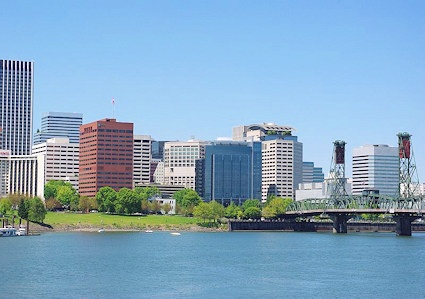Portland homeless tax wins handily amid virus woes

PORTLAND, Ore. (AP) — A measure to tax the wealthiest residents and the biggest businesses in the Portland area to raise $2.5 billion over a decade to address homelessness sailed to victory as final ballots were tallied Wednesday, even as the state faces crippling revenue losses and record-high unemployment due to the coronavirus.
Nearly 60% of voters in the three counties that make up the greater Portland region approved the tax in Tuesday’s primary election amid the greatest economic turmoil in years, a sign of just how intractable the homeless problem has become in the Pacific Northwest city.
The measure envisions a regional approach to solving the homeless crisis by taxing the ultra-wealthy that could be used in other cities, said Angela Martin, campaign director for HereTogether, the coalition that crafted it.
“What people across the country are realizing is that this coronavirus has laid bare the fractures that already existed in our communities and what I’m most excited about is that for the first time we aren’t doing a Band-Aid approach,” she said. “So what does it look like when we’re actually able to match the scale and scope of the problem with the proper resources?”
The ballot measure had been planned before the pandemic reduced the U.S. economy to tatters. Proponents, including the powerful Portland Business Alliance and major institutions like the NBA’s Trail Blazers, argued that the taxes are needed now more than ever as unemployment in Oregon hits 14% and state revenue forecasts plummet by $2.7 billion in the current biennium.
The measure was referred to voters by Metro, a unique regional agency that oversees growth, planning and development in Portland and its suburban communities.
Opponents, funded almost entirely by the Northwest Grocery Association, argued that the measure was ill-timed and that critical questions about oversight were unanswered in the rush to get it on the May ballot.
The measure has a “serious lack of accountability surrounding the management of taxpayer dollars,” said Joe Gilliam of the Northwest Grocery Association. “METRO won tonight. But now they must perform and meet voter expectation. Everyone is watching.”
The measure’s passage puts in place a 1% marginal income tax on the wealthiest residents and a 1% tax on gross profits for the region’s biggest businesses. Roughly 90% of residents and 94% of businesses will be exempt from the tax, supporters say.
The tax will apply to individual filers with a taxable income of more than $125,000 or joint filers with taxable income of more than $200,000. Joint filers making $215,000 a year, for example, would be taxed 1% on $15,000, or $150 a year.
The measure has a 10-year sunset clause and was expected to generate $2.5 billion before the economic fallout from the pandemic, but the recession’s impact on those estimates is unclear.
The first taxes would not be collected until 2021 and the money will be distributed to the three counties based on their percentage of the region’s overall population.
Read more at: https://apnews.com/e901d6553e4a22f2da1dae3d38e28616